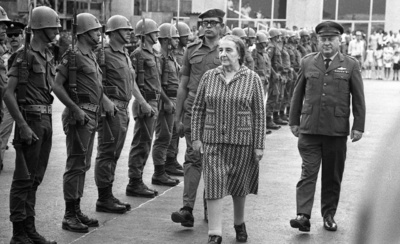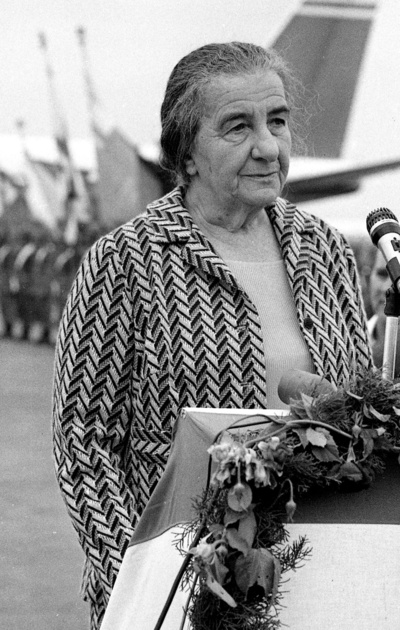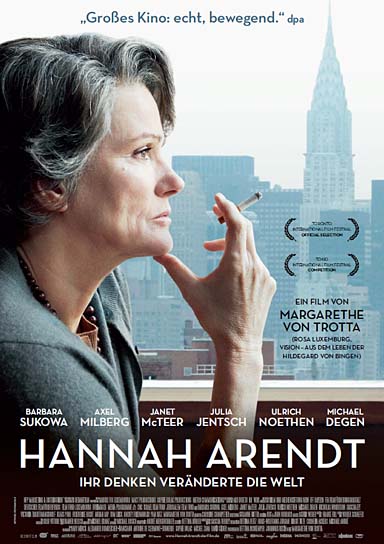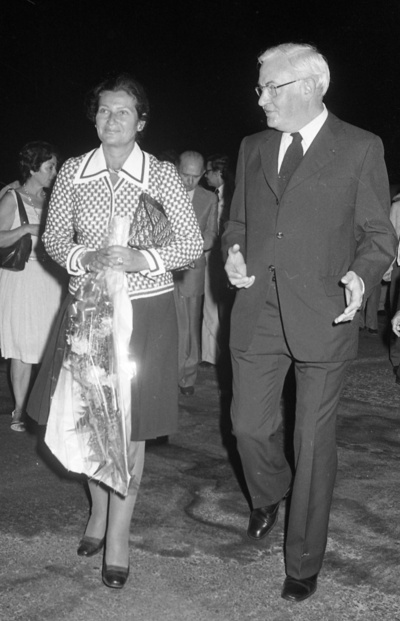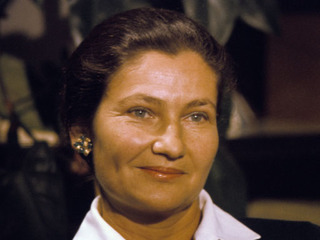-
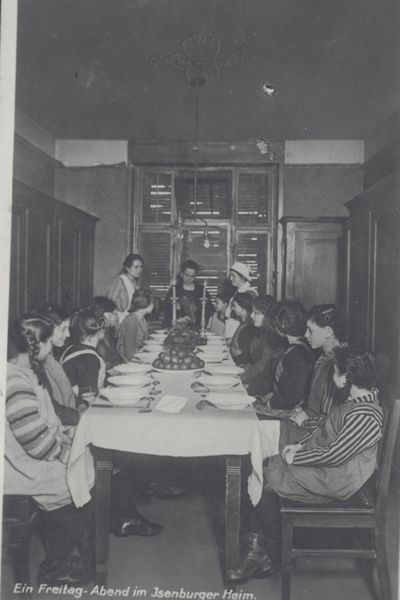
Young women at Sabbath dinner table; Heim des JuÌ Leo Baeck Research Institute |
- Over the course of the 20th century European society as a whole experienced dramatic social, political and economic transformations. Nowhere are these social shifts more apparent than in the margins of European society; minority groups who experienced both expanded opportunity and the painful limitations of access to that opportunity throughout the century. Jewish women experienced this and in many ways epitomize the 20th century European experience. Discriminated within society both because of their sex and religion, notwithstanding many Jewish women rose up to test the limitations ascribed to them. Thus they drove societal changes whose impact is felt to this day. This digital exhibit documents the #CenturyofChange through the lives of eight game-changing Jewish women whose lives have been documented visually in photographs, videos, and works of art on the Europeana platform, and whose life stories and accomplishments are preserved through the Jewish Women’s Archive. Each of these women is exceptional in her own right but together these women are representative of larger themes which transcend both their religion and gender. The diversity of these women’s paths speaks to the diversity of the 20th century experience in Europe and beyond.
-
Digital Exhibit Thematic Overview
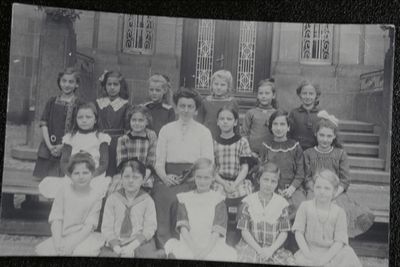
Group of young school girls with teacher. Leo Baeck Research Institute |
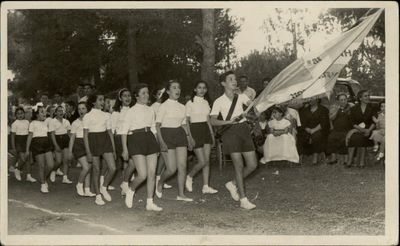
Photograph The Jewish Museum of Greece |
1 Education
-
At the beginning of the 20th century the majority of European society believed that a woman's place was in the home as a wife and mother. Although women's education was slowly expanding, the majority of women were still educated into domesticity, raised to be dutiful wives and mothers. However, this would change throughout the course of the 20th century. Building on the experiences of early pioneers in the late 19th century such as Aletta Jacobs and Rosa Luxemburg, in the 20th century growing numbers of women had access not only to primary education but also higher-level studies and professions. It is not negligible that Aletta Jacobs, Hannah Arendt, Aletta Jacobs, Golda Meir, Simone Veil ... >>
-
<< ... and Rita Levi-Montalcini all obtained advanced degrees, although not all were supported in these pursuits by their families. It is a testament to the options afforded to women in education even at the beginning of the 20th century that made the impressive trajectories of these women possible.
-
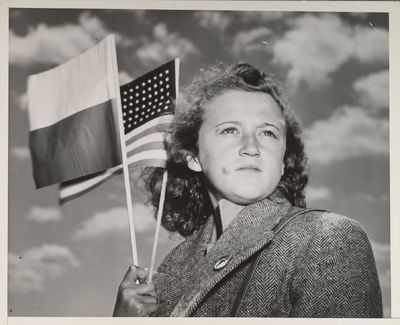
A young Jewish girl arrives in New York, ca. 1948 YIVO Institute for Jewish Research |
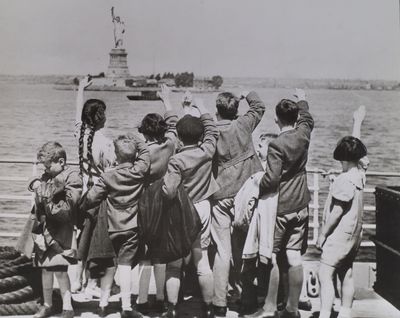
Jewish refugee children arriving in the United Sta YIVO Institute for Jewish Research |
2 Immigration
-
At the beginning of the 20th century the majority of world Jewry lived in Eastern Europe. By the end of the 20th century Jewish demography had shifted whereby the main centers of Jewish life were located in the United States and Israel. This mass migration was driven by multiple factors including but not limited to political instability, poverty, antisemitism, and war, universal factors of migration which would also drive millions of Europeans, regardless of religious background, to leave their homes and seek their fortunes elsewhere. It is not surprising that the three women born in Eastern Europe Emma Goldman, Golda Meir, and Hannah Arendt would all settle in the United States for a ... >>
-
<< ... period of time. Only Hannah Arendt permanently made the United States her home. Golda Meir eventually moved to mandate Palestine of her own volition - motivated by Zionist ideology. Emma Goldman was deported due to her radical political views. Rosa Luxemburg, who remained in Europe, is also an example of 20th century Jewish migration trends moving to Switzerland and then to Germany due to both her political convictions and desire to pursue higher education. However, not all migration was due to hardship, Rita Levi-Montalicini, moved to the United States in 1947 to accept a prestigious research appointment at Washington University. Although she would live in the United States for ... >>
-
<< ... twenty-six years she eventually returned to Italy. The lives of these women demonstrate that migration is rarely unidirectional and reaffirms the multiple factors that drive both mass and individual migration trends.
-
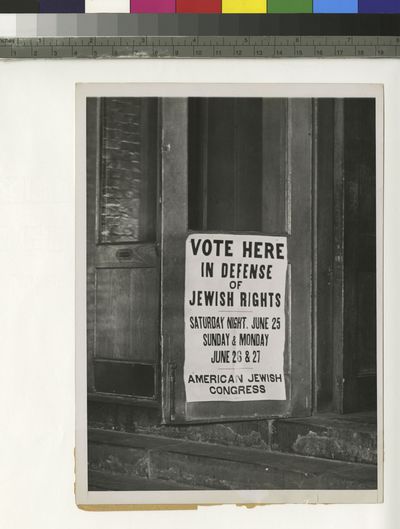
"Vote Here in Defense of Jewish Rights" American Jewish Historical Society |
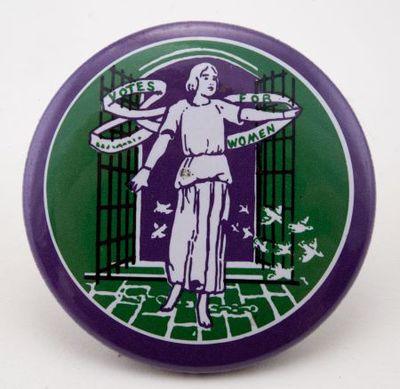
Button. 'Votes for Women' Atria, Kennisinstituut voor Emancipatie en Vrouwengeschiedenis |
3 Civil Rights
-
The 20th century was certainly the century of activism. The centrality of civil rights is perhaps the theme which binds all of these women together. From Aletta Jacobs and Simone Veil who believed that civility and gentility was the path to be heard and bring about change, to more radical thinkers such as Emma Goldman, Rosa Luxemburg, and Hannah Arendt whose ideas still shape radical political thought to this day. From issues specific to women such as abortion, birth control, and suffrage to universal themes like worker’s rights and the international peace movement Jewish women were at the forefront of these issues as activists, theoreticians, and political commentators. These positions ... >>
-
<< ... were not easy ones to take, both Rosa Manus and Rosa Luxemburg were murdered because of their ideas and activism and Emma Goldman was condemned to a life of exile.
-
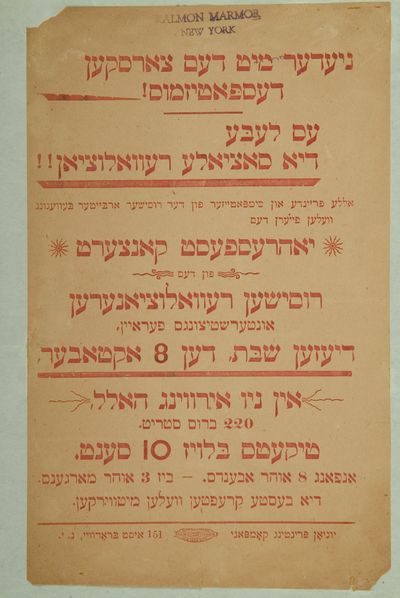
Handbill advertising a concert celebrating the fir YIVO Institute for Jewish Research |
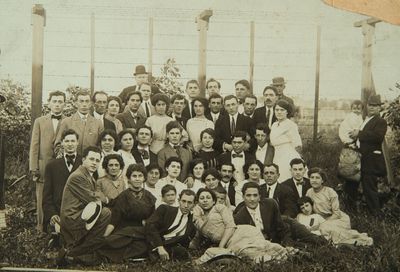
Members of the Jewish Socialist Verband, Chicago, YIVO Institute for Jewish Research |
4 Political Theorists & Politicians
-
One area where Jewish women were perhaps over represented in the 20th century is in the development of political theory, particularly in relation to socialism. Rosa Luxemburg’s writings on socialism, democracy, and internationalism, Hannah Arendt’s work on democracy, authority and totalitarianism, and Emma Goldman’s devotion to the principles of anarchism run the gamut of 20th century political thought. It is a testament to their writing and activism that their intellectual oeuvres are still studied and debated to this day. The 20th century is also the moment when women began to take a more active role in politics as elected representatives, although never reaching parity in representation ... >>
-
<< ... with their male colleagues. Golda Meir is perhaps the most well-known Jewish female politician of all time having served as prime minister for the state of Israel from 1969-1974. However, she is far from alone. Rita Levi-Montalcini, was appointed to the Italian Senate in 2001, and acted as an ambassador for the Food and Agriculture Division of the United Nations in the 1990s combating global hunger. In France, Simone Veil is often considered the most beloved French politician of all time. She held the position of Health Minister, and was the first woman to preside over the European parliament.
-
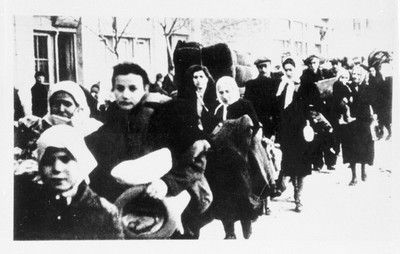
Photograph The Jewish Museum of Greece |
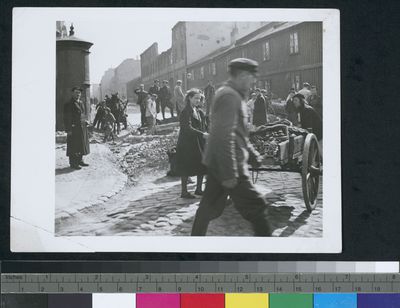
Construction of part of the wall that sealed off t YIVO Institute for Jewish Research |
5 World War II
-
World War II upended European society as a whole, and European Jewish life in particular. We will never know how many women who could have changed society were murdered before they had the chance to make their mark. Tragically Rosa Manus was deported and murdered in Auschwitz, targeted by the Nazis both because of her religion and political beliefs. Other women such as Simone Veil, who was deported to Auschwitz, and Rita Levi-Montalcini spent the war in hiding, survived the war, and would later work to rebuild the continent from its ashes. Nazism forced Hannah Arendt to flee first to France and then to the United States where she used her pen to sharply condemn fascism and the Axis ... >>
-
<< ... powers. Golda Meir worked from Mandate Palestine to smuggle Jews out of Europe throughout the duration of the war. However, none who survived the war remained unscathed, all lost family, friends and saw their worlds change dramatically over the course of less than a decade.
-

Young women at Sabbath dinner table; Heim des JuÌ Leo Baeck Research Institute |
6 Judaism
-
Judaism was instrumental to the lives of these women in multiple overlapping ways influencing their world views, and identities to which they were at times ascribed and at times constructed. For example, Aletta Jacobs makes no reference to her Jewish background in her autobiography, even though her family’s network of Jewish doctors, academics, and intellectuals was foundational in allowing her to access to the medical profession. Although none of these women can be considered “religious,” the role of Judaism was ever present in their lives. Some explicitly rejected Judaism seeing it as the source and essence of gendered and classist power structure such as Rosa Luxemburg. She is perhaps ... >>
-
<< ... the archetype Marxist who jettisoned her Jewish particularism for communist universalism, believing that socialism would solve the problem of anti-Semitism. However, the rejection of Judaism is also a commentary on Judaism and the influence it played in her life and the shaping of her world view. Others maintained close ties to Judaism such as Simon Veil who became active in the Liberal Jewish movement in France and a staunch supporter of the first female rabbi in France Delphine Horvilleur – the epitome of the 21st century Jewish European woman.
-
-
The Women of the Century of Change
Table of Contents
-
Rosa Luxemburg
1871-1919, b. Poland, d. Germany
Despite all this! (Shooting Rosa Luxemburg) - Lino Stadtgeschichtliches Museum Leipzig |
Despite all this! (Shooting Rosa Luxemburg) - Linocut
- Rosa Luxemburg was one of the great Marxist theorists of the twentieth century; her radical conception of socialist democracy stands in opposition to both bolshevik authoritarianism and technocratic reformism. Born in the Polish city of Zamosc, she grew up in an assimilated, middle class Jewish family. She learned German at home and, undoubtedly, gained a certain affinity for enlightenment ideals. Although an avowed socialist, Luxemburg would never join the famous Jewish socialist organization known as the Bund, and she was basically unconcerned with issues of identity. Her engagement with political issues began while she was still in high school as a member of the Proletariat, the first socialist organization in Poland. Luxemburg fled her homeland in 1887 and later enrolled in the University of Zurich, where she completed a dissertation on “The Industrial Development of Poland” (1898). She would spend the majority of her adult life in Germany, and in 1918, she joined the Spartacus group—which would form the nucleus of the German Communist Party (KPD). The Spartacist revolt broke out in 1919 and Rosa Luxemburg, seeking to remain in contact with the masses, was brutally murdered at the hands of proto-Nazi thugs in the employ of the government. No matter what the movement with which she was connected, Rosa Luxemburg maintained her critical perspective as well as her commitment to socialism, democracy and internationalism. Luxemburg never sought any special treatment for women and, essentially, her view of sexism was similar to that of antisemitism: both would ultimately be abolished with the advent of a truly socialist society.
-
Aletta Jacobs
1854-1929, Netherlands
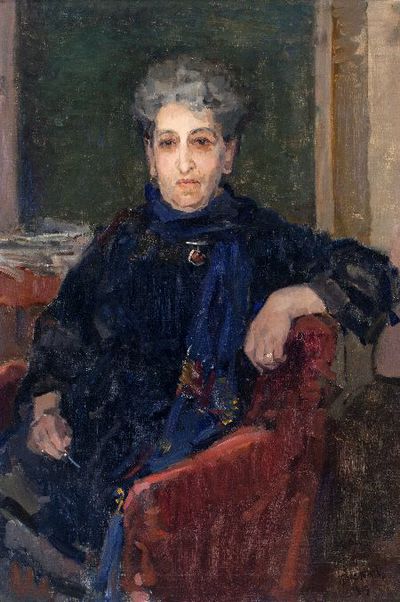
Aletta Jacobs - Oil Painting Atria, Kennisinstituut voor Emancipatie en Vrouwengeschiedenis |
Aletta Jacobs - Oil Painting
Aletta Jacobs - With Signature International Institute of Social History |
Aletta Jacobs - With Signature
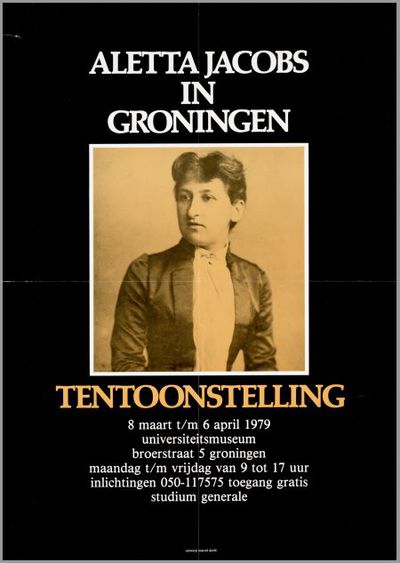
Aletta Jacobs in Groningen Poster Atria, Kennisinstituut voor Emancipatie en Vrouwengeschiedenis |
Aletta Jacobs in Groningen Poster
- A pioneer in many realms—birth control, women’s suffrage, peace activism, and envisioning a wider future for women—Aletta Henriette Jacobs was born in the small town of Sappemeer, Netherlands, the eighth of eleven children of Abraham Jacobs, a country doctor, and Anna de Jongh. Her assimilated middle class Jewish family maintained social and intellectual ties with other Jewish families in the area. As a child she accompanied her father on his medical visits, thus inspiring her to pursue a career in medicine, a vocation not open to women at the time. She gained special permission from the prime minister J.R. Thorbecke to enroll in the faculty of medicine at the University of Groningen in 1871. She graduated in 1879 becoming the first female physician in the Netherlands. Later, while pursuing further clinical training in London, she met birth-control advocates and suffrage leaders. Upon her return to the Netherlands she introduced the pessary (diaphragm) despite intense opposition from male colleagues; held a free clinic for poor women, and campaigned to change the unhealthy working conditions of salesgirls. At the 1899 International Council of Women’s meeting in London she met inspiring leaders such as Susan B. Anthony. In 1903 she gave up her medical practice, and committed herself to the struggle for women’s suffrage. Up until the outbreak of WWI she travelled extensively with Carrie Chapman Catt documenting the situation of women around the globe and, where possible, encouraged women to improve their position. After the outbreak of war in 1914, Jacobs strove to use her international network to try to stop the slaughter while continuing to lead Dutch women in their struggle for suffrage.
-
Emma Goldman
1869-1940, Russia/Canada
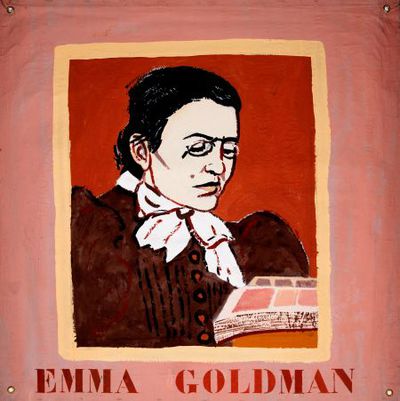
Portrait of Emma Goldman Atria, Kennisinstituut voor Emancipatie en Vrouwengeschiedenis |
Portrait of Emma Goldman
Poster with quote of Emma Goldman International Institute of Social History |
Poster with quote of Emma Goldman
Poster in English and Yiddish International Institute of Social History |
Poster in English and Yiddish
- Emma Goldman was born in 1869, in the Jewish quarter of Kovno, Lithuania, to Abraham and Taube (Bienowitch) Goldman. The antisemitism of czarist Russia propelled Goldman’s family to move multiple times in search of economic opportunity and political stability. These experiences of displacement, coupled with an aversion to the domesticity of women’s lives in the traditional Jewish family, drove Goldman to immigrate to New York at age sixteen in search of a better life. However, the reality of life in America left much to be desired. She was barely able to make ends meet working in a factory in Rochester, New York. Her personal situation, coupled with the violent attacks on peaceful protesters striking for an eight-hour workday turned her into an activist. In 1889 she moved to New York City’s Lower East Side, joining a growing coterie of leftist intellectuals. She was quickly recognized as an eloquent and flamboyant speaker originally lecturing in German and Yiddish to immigrants anxious to improve their miserable working conditions, and later in English expanding her repertoire to include sexual and reproductive freedom. Sentenced to a year in prison in 1893 for a speech at a demonstration of the unemployed, Goldman was undeterred by the threat of harsh consequences, devoting her life to teaching the principles of anarchism. In the context of World War I, her anti-conscription lectures and organizing efforts were considered a threat to national security and she was sentenced to eighteen months in federal prison culminating in being deported to Russia in 1919. Goldman would live out the rest of her life between Europe and Canada, speaking out about the rights of workers, opposing fascism, and advocating for the rights of women.
-
Rosa Manus
1881-1943, Netherlands
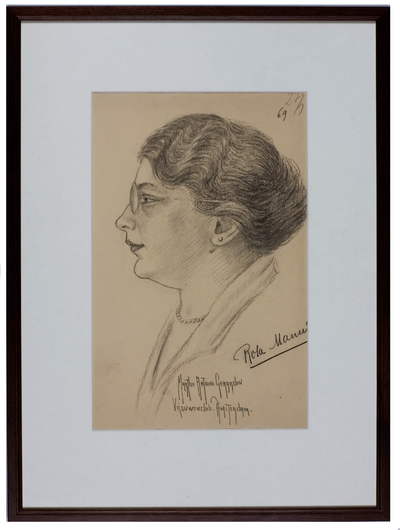
Portrait in pencil of Rosa Manus Atria, Kennisinstituut voor Emancipatie en Vrouwengeschiedenis |
Portrait in pencil of Rosa Manus
- Rosa Manus was one of the leading Dutch feminists before World War II, born into a prosperous bourgeois Jewish family. From an early age she longed for independence, education and paid employment—aspirations that had no place in the environment in which she grew up. As her desire to become a nurse was not supported, she took up philanthropy. In 1908, during the Congress of the International Woman Suffrage Alliance she met Aletta Jacobs and Carrie Chapman Catt, forming a friendship with both. From then on she became increasingly well known as a feminist, partly through being the organizer in 1913 of the exhibition “De Vrouw 1813–1913,” which portrayed the life of Dutch women. In the following year she and Aletta Jacobs attended the conference of the International Woman Suffrage Alliance in London and in 1915, she helped set up the International Women’s Conference against War, which was organized by the Women’s International League for Peace and Freedom. From then on her life followed two distinct paths: women’s suffrage and pacifism. More than other feminists, Rosa Manus suffered from the difficult position in which Jews were placed following the rise of fascism in Germany, when many women’s organizations were anxious to avoid being perceived as too Jewish. By 1939, Rosa Manus had no illusions about the impact of Nazism, she was active in helping the stream of German refugees to the Netherlands and set up a center for refugee women. Soon after the invasion of the Netherlands in 1940 she was arrested due to her outspoken pacifism and as a Jew she was quickly deported. Although her name appears on the memorial to those who died in Ravensbrück, recent scholarship confirms that she was murdered in Auschwitz.
-
Golda Meir
1898-1978, b. Ukraine, d. Israel
- Golda Meir was born in 1898, in Kiev, Ukraine into a traditional Jewish family. Her early childhood was marked by abject poverty and pogroms, formative memories that would forge her commitment to ensuring Jewish security. In 1903, her father left for America and when Golda was eight the family joined him. She often fought with her family in a desire to assert independence, gain an education and eschew the roles traditionally ascribed to women. Eventually her family acquiesced and she trained as a teacher. Up to this point Meir’s life followed a classic immigrant trajectory, however she ultimately had a singular destiny. In 1917, encouraged by the Balfour declaration she hastily married, and moved to mandate Palestine with her new husband, initially settling on a kibbutz. In Israel Meir flourished, her kibbutz sent her for management training and she eventually became its representative to the Histadrut [General Federation of Labor]. However, throughout her life there was a tension between her skill as an administrator and the obligations of being a wife and mother, raising her children apart from her husband although they never divorced. With the creation of the state of Israel in 1948, Meir’s perfect English, nerves of steel, and strong organizational skills proved a major asset to the new state. Elected to the Knesset in 1949 she held the Labor portfolio for seven years, when in 1956, Ben-Gurion made her Foreign Minister, the second-highest position in the government. Although she intended to retire from government in 1966, she was persuaded to stay on as she was seen as a mediating force within her party, becoming prime minister after the unexpected death of Levi Eshkol in 1969. She joined the small club of 20th century women to hold the position of head of state. Meir never identified as a feminist, and she remained ambivalent about the role of women in society. Her success was perhaps singular but the personal struggles attached to this success were experienced by many women of her time.
-
Hannah Arendt
1906-1975, Germany/USA
Hannah Arendt and the Politics of Friendship OAPEN Foundation |
Hannah Arendt and the Politics of Friendship
- Hannah Arendt was born in 1906, in Germany. An only child whose youth was punctuated by grief and terror. Her father died when she was seven, and the constant fighting between the Russian and German armies near her home was a source of dread. She studied theology and philosophy and in 1929 completed her doctoral dissertation on the idea of love in the thought of St. Augustine, having studied under luminaries such as Rudolf Bultmann and Martin Heidegger. However, the rising antisemitism afflicting the German polity distracted her from metaphysics and compelled her to face the historical dilemma of German Jews. As the National Socialists grasped power, Arendt became a political activist and, beginning in 1933, helped the German Zionist Organization to publicize the plight of the victims of Nazism and research on anti-Semitic propaganda, for which the Gestapo arrested her. Upon being released she escaped to Paris, where she remained for the rest of the decade helping to rescue Jewish children from the Third Reich and bringing them to Palestine. When Germany invaded France, she escaped to the United States where she would live for the rest of life. In America, Arendt quickly became a celebrated intellectual. The publication of The Origins of Totalitarianism, made Arendt an intellectual celebrity in the early years of the Cold War. Although a notoriously private person, Hannah Arendt was one of the nation’s most prominent intellectuals. The first woman to become a full professor at Princeton University, she subsequently taught at the University of Chicago, Wesleyan University, and finally the New School for Social Research. Her relationship with the organized Jewish community was complicated, particularly after the publication of Eichmann in Jerusalem, her assertion that Eichmann exemplified “the banality of evil,” was interpreted as an apparent elevation of Eichmann’s character, although Judaism remained foundational to her world view. To this day, her books continue to have a major impact on political theory, particularly in North America, Europe, and Australia.
-
Rita Levi-Montalcini
1909-2012, Italy
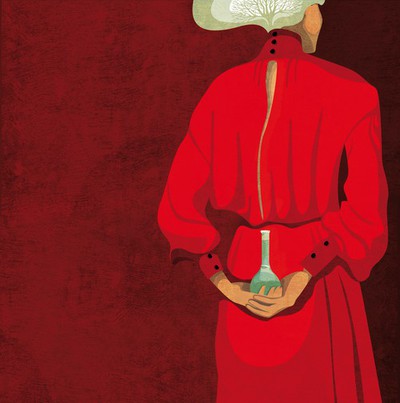
Rita Levi-Montalcini - digital illustration Wellcome Collection |
Rita Levi-Montalcini - digital illustration
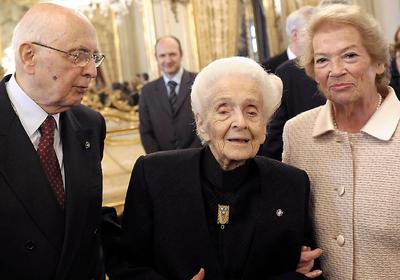
Rita Levi-Montalcini on her 100th birthday Archivio storico della Presidenza della Repubblica |
Rita Levi-Montalcini on her 100th birthday
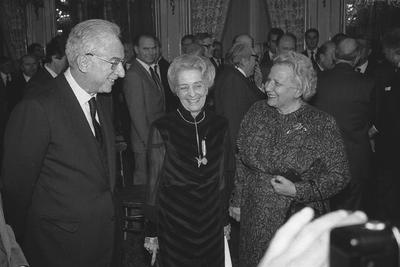
Nobel Prize Celebration Archivio storico della Presidenza della Repubblica |
Nobel Prize Celebration
- Born in Turin in 1909, Rita Levi-Montalcini was born into a middle class Jewish family. Her father opposed higher education for girls believing that a woman’s place was in the home. Nevertheless he agreed to Rita’s wish to study medicine. Upon completing degrees in medicine and surgery summa cum laude at the University of Turin in 1936, she began to study neurology and psychiatry. Due to the 1938 Italian race laws she accepted a research position in Brussels although she returned to Italy in 1939, fearing a German takeover of Belgium. In Italy, Levi-Montalcini independently conducted scientific research, experimenting on the nervous systems of chicken embryos resulting in the publication of several papers. With the establishment of the Fascist Salò Republic the Levi-Montalcini family went into hiding, where they remained until liberation in 1944. In 1947 she was invited to Washington University in St. Louis, where she remained for twenty-six years, continuing her research in neurobiology and on cancer cells. For years she searched for “causes of growth,” during which time she discovered Nerve Growth Factor (NGF), which is responsible for the development and distribution of nerve cells. Her research and discovery of NGF won her the Nobel Prize for Medicine in 1986. Returning to Italy in the 1970s, Levi-Montalcini continued her research at the national Institute of Neurobiology. In addition to her scientific research, she was the first woman to be appointed to the board of the Enciclopedia Italiana, where she served from 1993 to 1998. Throughout her life she combined research with wide-scale public activity. In 1999 she was appointed ambassador to the Food and Agriculture Organization of the United Nations, as part of which she published and engaged in broad public activity to combat world hunger. In 2001 the Italian senate appointed her a senator for life.
-
Simone Veil
1927-2017, France
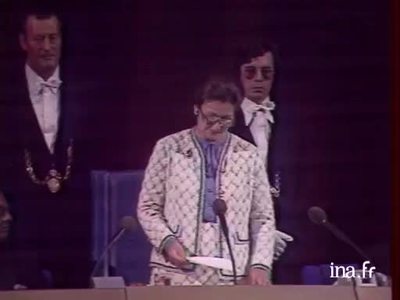
Addressing the European Parliament Institut national de l'audiovisuel |
Addressing the European Parliament
- Simone Veil was born in Nice in 1927 to middle-class Jewish parents who very much represented the modern secular Jewish world view of the first half of the century: active in various social Jewish organizations, they were known to be staunch supporters of the secular state and the French values of Liberty, Fraternity and Equality. With the rise of Nazism in Europe these values were put to a most stringent test, with tragic outcomes. In 1944, at the age of 16, Simone and her entire family were deported to concentration camps. Only Simone and her two sisters survived the war, whereas her parents and brother were murdered. After the war Simone and her sisters decided to remain in France. After studying law, Veil would dedicate the rest of her life to public service defending women's rights, helping underrepresented communities and rebuilding Europe. As the French minister of health in the 1970s, she was a staunch supporter of women’s reproductive rights. Under her tenure as Minister of health, contraception became more accessible and in 1975 abortion was legalized. To this day, the law protecting women’s rights to control their bodies in France is called the Veil Law. Veil served as an elected official of the European Parliament from 1979 to 1993, holding the position of president for the majority of that period. In this capacity, she worked tirelessly to defend human rights, strengthen intra-European ties, promote European culture and protect the most vulnerable in society. Even after retiring from politics Veil remained active in French society. In 2008, Veil was elected to the Académie Francaise, being only the sixth woman in the institution’s almost 500 year old history to receive such an honour. To this day Veil continues to be one of the most beloved Frenchwomen of all time.
- Digital curation and realisation:
Dr. Sasha Goldstein-Sabbah
Technical realisation:
Jewish Heritage Network
The exhibition is part of the European XX project.
In collaboration with the Jewish Cultural Quarter, the Jewish Women’s Archive, and Europeana
Please fill the survey




